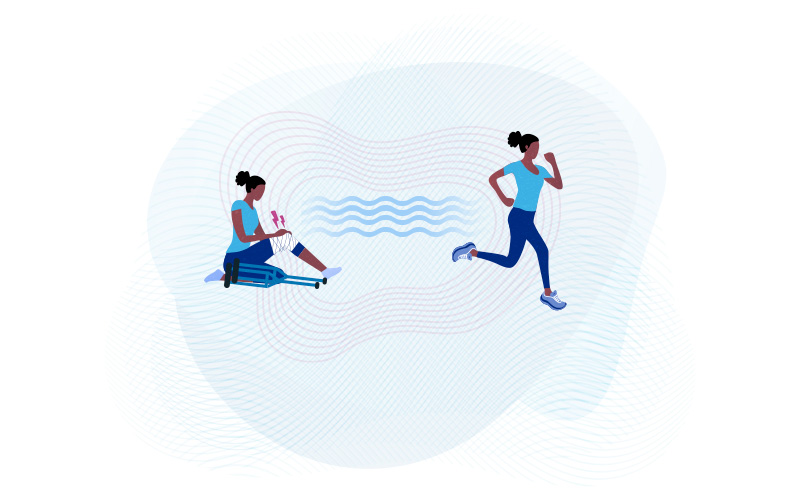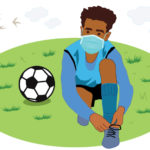Not just a physical thing: The psychology of sports injuries and recovery

“Nobody plays sports expecting to get injured, but unfortunately, injuries are part of sports,” says Melissa Christino, MD. As a surgeon in the Sports Medicine Division at Boston Children’s Hospital, Christino helps athletes recover from sports injuries, some of which keep her patients on the sidelines for weeks or months at a time.
Key takeaways
Rest is integral to physical healing. However, for some athletes, being injured and getting taken out of their sport can trigger significant mental health issues — anxiety, depression, and eating disorders to name a few.
A recent literature review by Christino and her colleagues reinforced the fact that injury and healing involve both the body and the mind. Certain psychological responses can complicate the healing process, particularly when an injury is extensive or requires surgery. Yet other psychological reactions can actually boost recovery and help an athlete return to sports healthy and strong.
Here, Christino discusses how injuries can affect athletes and how mental health can either delay healing or help athletes return to play.
Why is an athlete’s mental health so important to sports injury recovery?
I was a student athlete, so I understand how integral sports can be to athletes’ lives. If someone had told me I couldn’t play sports when I was 14, even for a limited time, I would have been devastated.
For an athlete to perform at their optimal level, they have to be sound both physically and emotionally. Simone Biles drove this point home when she chose not to compete in several gymnastic events at the Tokyo Olympics this summer.
That’s why it’s important to look out for an injured athlete’s mental health as well as their physical health. An injury that takes an athlete out of play for a long period can be traumatizing for someone who has structured their life around sports. If their medical team understands this, they can watch for maladaptive responses and be ready to help patients who are struggling.
How can psychological factors affect recovery from a sports injury?
We define full recovery as being able to return to sport at the athlete’s previous level of play without reinjury.
Potentially harmful psychological factors
- fear of movement
- fear of reinjury
- depression
- unrealistic expectations for recovery
Potentially beneficial psychological factors
- athletic identity
- self-efficacy
- self-esteem
- psychological readiness to return to sport
- realistic expectations for recovery
- resilience
Several studies have shown that injured athletes with higher levels of stress, anxiety, and fear of reinjury are less likely to fully recover. In one study of ACL reconstruction patients, those with higher levels of fear were 13 times more likely to suffer a second ACL tear within two years of returning to sports than those who were less fearful.
Depression, a common experience for injured athletes, has been associated with worse patient-reported outcomes, higher levels of pain, and increased rates of post-surgical complications.
On the flip side, some psychological factors have been associated with improved outcomes. Having a high athletic identity can motivate an athlete to commit fully to their rehabilitation and getting back to sports as soon as they are able.
What if a provider feels unprepared to address a suspected mental health issue?
This is a valid concern, but resources may be closer than many providers realize. The patient’s physical therapist could be a great source of baseline support for a patient who’s feeling down or struggling with a lack of motivation. Many PTs work with patients several times a week and become almost like a coach through their recovery.
More serious issues, like anxiety, depression, or persistently intrusive thoughts, should be addressed by a mental health professional. It’s a good idea to know what services are available in your practice, hospital, or local community. Asking a peer where they refer patients is a good place to start.
Is there anything else providers can do to help athletes work through the emotional side of their recovery?
The goal of medicine is taking care of the whole person — not just their condition or injury. While mental health issues fall outside of traditional orthopedic training, simply asking a patient how they’re coping from an emotional standpoint can be extremely valuable to their recovery.
It’s also helpful to normalize the situation for patients and families. Most athletes are not accustomed to showing weakness. If they are sad or upset, many try to fight through their feelings or push them aside. Providers can help change this culture by letting patients know it’s OK if they are struggling emotionally and that there are ways to get help.
It’s not fun, but difficult emotions are a normal part of getting injured. Athletes don’t have to go through them alone.
Learn more about the Sports Medicine Division.
Related Posts :
-

Could returning to sports after COVID-19 harm kids’ mental health?
After a year away from playing, athletes everywhere are excited to jump back into the sports they love. And for ...
-

Sports injuries: Why ignoring pain is bad for athletes
“No guts, no glory.” “No pain, no gain.” “Rub some dirt in it.” Sports clichés like these encourage young ...
-

A safe, pain-specific anesthetic shows preclinical promise
All current local anesthetics block sensory signals — pain — but they also interrupt motor signals, which can be problematic. For example, ...
-

Adam takes a pause from his active life for non-ossifying fibroma
Adam was 11 in early 2024 when he and his bike slid under a downed tree. Such events aren’t unusual for ...





